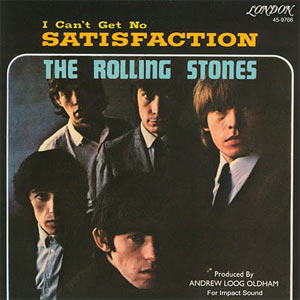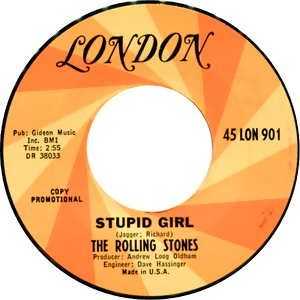
"Street Fighting Man" is a song by the English rock band the Rolling Stones, written by the songwriting team of Mick Jagger and Keith Richards. Considered one of the band's most popular and most controversial songs, it features Indian instrumentation contributed by Brian Jones, which has led to it being characterized as a Raga rock song. It also features controversial and ambiguous lyrics about armed revolution. In the United States, it was released as a single in August 1968, while it was not released in the United Kingdom until four months later on the Beggars Banquet album, where it opened side two. The B-side of the American single featured "No Expectations", considered one of the final Stones tracks in which founding member Jones played a significant role in its construction.

Let It Bleed is the eighth British and tenth American studio album by the English rock band the Rolling Stones, released 28 November 1969 on London Records in the United States and shortly thereafter by Decca Records in the United Kingdom. Released shortly after the band's 1969 American Tour, it is the follow-up to 1968's Beggars Banquet. As with Beggars Banquet, the album marks a return to the group's more blues-sound approach that was prominent in the pre-Aftermath period of their career. Additional sounds on the album draw influence from gospel, country blues and country rock.

Out of Our Heads is the 3rd British and 4th American studio album by the English rock band the Rolling Stones, released in two editions with different covers and track listings. In the US, London Records released it on 30 July 1965, while Decca Records released its UK edition on 24 September 1965.

"Brown Sugar" is a song recorded by the English rock band the Rolling Stones. Written primarily by Mick Jagger, it is the opening track and lead single from their album Sticky Fingers (1971). It became a number one hit in both the United States and Canada. In the United Kingdom and Ireland, it charted at number two. In the United States, Billboard ranked it as the number 16 song for 1971. Rolling Stone ranked it number 495 on its list of the 500 Greatest Songs of All Time in 2010 and number 490 in 2004 and at number five on their list of the 100 Greatest Guitar Songs of All Time.

The Rolling Stones, Now! is the third American studio album by English rock band the Rolling Stones, released on 13 February 1965 by their initial American distributor, London Records. Although it contains two previously unissued songs and an alternative version, the album mostly consists of songs released earlier in the United Kingdom, plus the group's recent single in the United States, "Heart of Stone" backed with "What a Shame". Mick Jagger and Keith Richards wrote four of the songs on the album, with the balance composed by American rhythm and blues and rock and roll artists.

"Love in Vain" is a blues song written by American musician Robert Johnson. Johnson's performance – vocal accompanied by his finger-style acoustic guitar playing – has been described as "devastatingly bleak". He recorded the song in 1937 during his last recording session and in 1939 it was issued as the last of his original 78 rpm records.

12 × 5 is the second American studio album by the English rock band the Rolling Stones, released in 1964 following the success of their American debut The Rolling Stones , is an expanded version of the EP Five by Five, which had followed their debut album in the UK.

Got Live If You Want It! is a six-song extended play (EP) release by the Rolling Stones featuring live recordings from 1965. The title is a pun on the swamp blues song "I Got Love If You Want It" by Slim Harpo; the Stones recorded his "I'm a King Bee" for their 1964 debut album. Got Live If You Want It! reached number one in the UK and was the group's last EP.

Flowers is the second compilation album by the Rolling Stones, released in the summer of 1967. The group recorded the songs at various studios dating back to 1965. Three of the songs had never been released: "My Girl", "Ride On, Baby" and "Sittin' on a Fence", the first of which was recorded in May 1965 during the sessions for "(I Can't Get No) Satisfaction," and the other two of which were recorded in December 1965 during the first lot of Aftermath sessions. The rest of the album tracks either appeared as singles or had been omitted from the American versions of Aftermath and Between the Buttons.

"I've Been Loving You Too Long" is a soul music ballad written by Otis Redding and Jerry Butler. Considered by music critics and writers to be one of Redding's finest performances and a soul classic, it is a slow, emotional piece with Redding's pleading vocals backed by producer Steve Cropper's arpeggiated guitar parts and a horn section.

"Heart of Stone" is a song by the English rock band the Rolling Stones, credited to the songwriting partnership of Jagger/Richards. London Records first issued it as a single in the United States in December 1964. The song was subsequently included on The Rolling Stones, Now! and Out of Our Heads.
"You Got the Silver" is a song by the English rock and roll band the Rolling Stones from their 1969 album Let It Bleed. It was also released as the B-side to the "Let It Bleed" single in Japan.

"Bitch" is a song recorded by the English rock band the Rolling Stones. Written by Mick Jagger and Keith Richards, "Bitch" is a "hard-bitten rocker" featuring Jagger on vocals and a powerful horn line. It was released as the B-side to the advance single, "Brown Sugar", from their ninth British and eleventh American studio album, Sticky Fingers. It was originally released one week before the album. Despite not being used as an official single by itself, the tune has garnered major airplay from AOR radio stations. The song was recorded in October 1970 at London's Olympic Studios, and at Stargroves using the Rolling Stones Mobile studio.

"(I Can't Get No) Satisfaction" is a song recorded by the English rock band the Rolling Stones. A product of Mick Jagger and Keith Richards' songwriting partnership, it features a guitar riff by Richards that opens and drives the song. The riff by Richards is widely considered one of the greatest hooks of all time. The song lyrics refer to sexual frustration and commercialism.

"Play with Fire" is a song by the English rock band the Rolling Stones, originally released as B-side to the song "The Last Time". It was later included on the American release of their 1965 album Out of Our Heads.

"The Spider and the Fly" is a song by English rock band the Rolling Stones, recorded in May 1965 and first released on the US version of their 1965 album Out of Our Heads. In the UK, it was released as the B-side to "(I Can't Get No) Satisfaction". In 1971, the song was released on an album for the first time in the UK on the Decca Records compilation Stone Age.

"Memo from Turner" is a solo single by Mick Jagger, featuring slide guitar by Ry Cooder, from the soundtrack of Performance, in which Jagger played the leading role of Turner, a reclusive rock star. It was re-released in October 2007 on a 17-song retrospective compilation album The Very Best of Mick Jagger, making a re-appearance as a Jagger solo effort. After its original release in 1970, it was included on Rolling Stones compilations, such as Singles Collection: The London Years as a track credited to the Jagger/Richards songwriting partnership. "Memo from Turner" was ranked No. 92 in the 100 Greatest Guitar Songs list of Rolling Stone.

"Stupid Girl" is a song recorded by the English rock band the Rolling Stones. Written by Mick Jagger and Keith Richards, the song featured on the band's 1966 album Aftermath. It was also issued as the B-side of the U.S. "Paint It Black" single.

"Tell Me " is a song by the English rock band the Rolling Stones, featured on their 1964 self-titled album. It became the first A-side single written by Jagger/Richards to be released, although not in the United Kingdom. The single reached number 24 in the United States and the top 40 in several other countries.
"I Am Waiting" is a song recorded by the English rock band the Rolling Stones. It was written by Mick Jagger and Keith Richards and released on the band's 1966 studio album Aftermath.















